Analyzing Tesco's Reward System: Factors, Principles, and Policies
VerifiedAdded on 2021/02/21
|15
|5207
|316
Report
AI Summary
This report provides a comprehensive analysis of reward management at Tesco, examining the internal and external factors influencing its reward policies. It delves into the impact of business drivers, such as affordability, benchmarking, market position, and economic outlook, on reward decisions. The report explores various types of reward intelligence, including salary surveys, consultant insights, recruitment agencies, market intelligence, and sector analysis. Furthermore, it outlines the key principles of total reward approaches, emphasizing equity, fairness, transparency, and consistency. The contribution of both intrinsic and extrinsic rewards are considered, alongside the reward policies and practices implemented by Tesco. The report concludes by examining the role of line managers in reward decision-making, offering a holistic view of Tesco's reward management strategies.
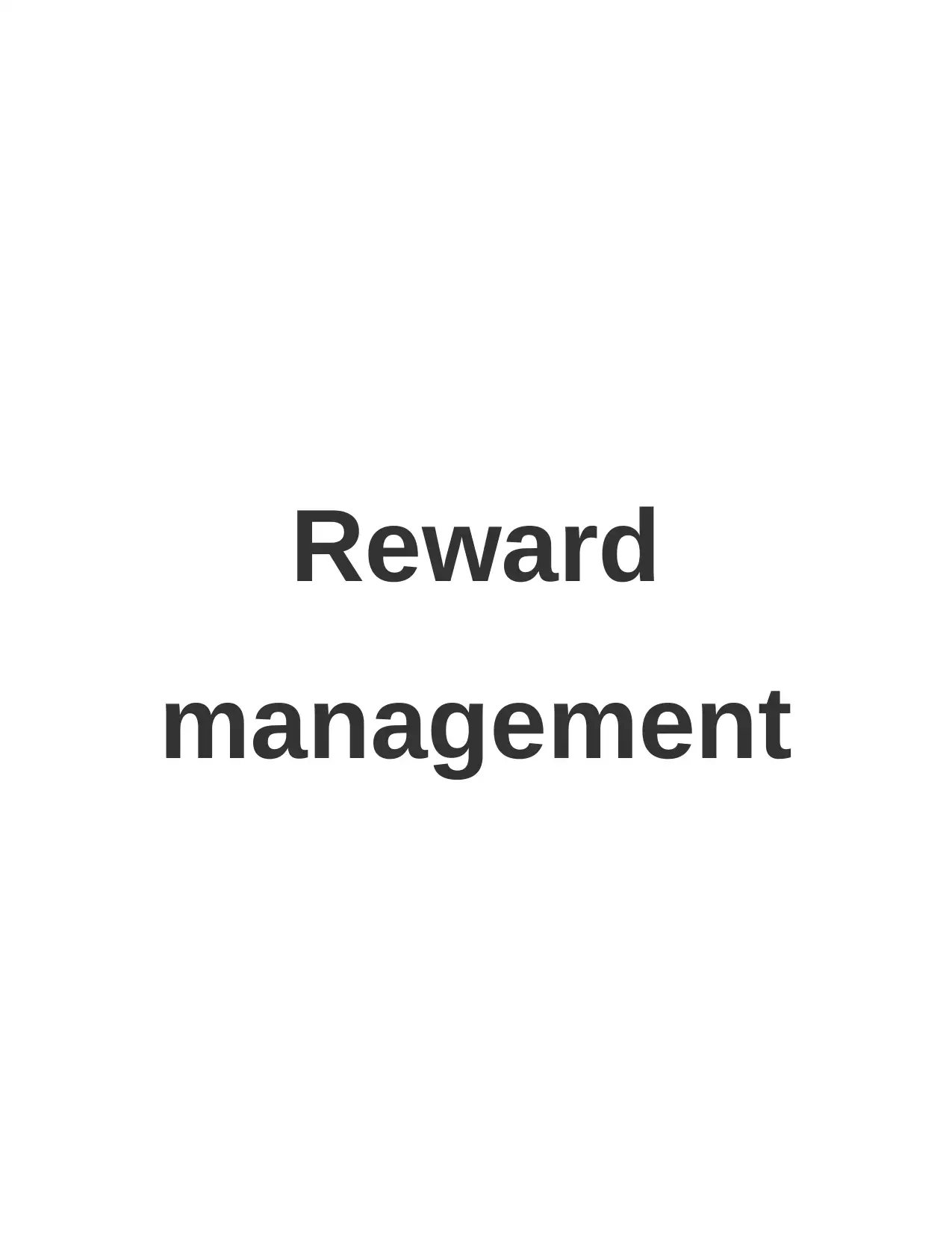
Reward
management
management
Paraphrase This Document
Need a fresh take? Get an instant paraphrase of this document with our AI Paraphraser
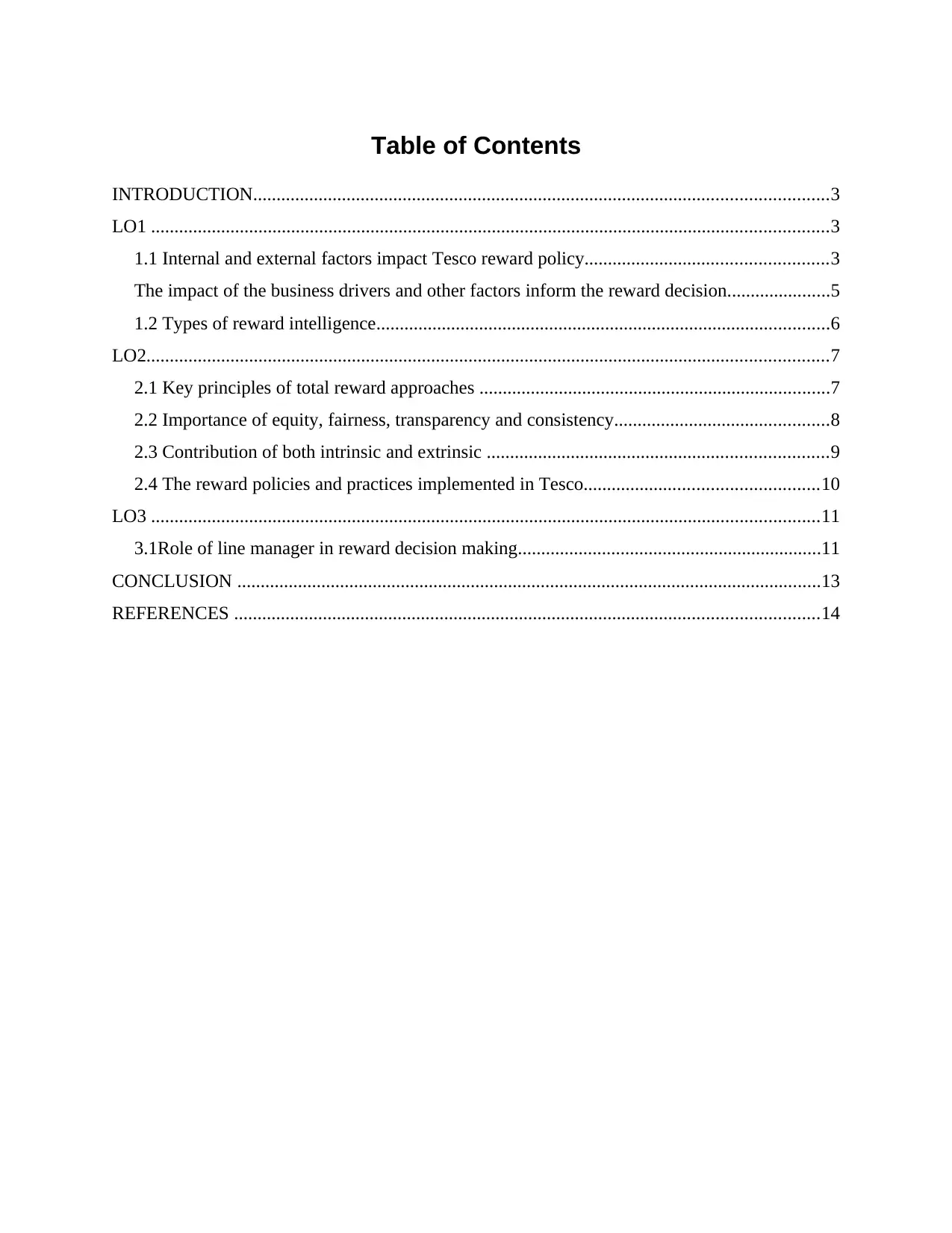
Table of Contents
INTRODUCTION...........................................................................................................................3
LO1 .................................................................................................................................................3
1.1 Internal and external factors impact Tesco reward policy....................................................3
The impact of the business drivers and other factors inform the reward decision......................5
1.2 Types of reward intelligence.................................................................................................6
LO2..................................................................................................................................................7
2.1 Key principles of total reward approaches ...........................................................................7
2.2 Importance of equity, fairness, transparency and consistency..............................................8
2.3 Contribution of both intrinsic and extrinsic .........................................................................9
2.4 The reward policies and practices implemented in Tesco..................................................10
LO3 ...............................................................................................................................................11
3.1Role of line manager in reward decision making.................................................................11
CONCLUSION .............................................................................................................................13
REFERENCES .............................................................................................................................14
INTRODUCTION...........................................................................................................................3
LO1 .................................................................................................................................................3
1.1 Internal and external factors impact Tesco reward policy....................................................3
The impact of the business drivers and other factors inform the reward decision......................5
1.2 Types of reward intelligence.................................................................................................6
LO2..................................................................................................................................................7
2.1 Key principles of total reward approaches ...........................................................................7
2.2 Importance of equity, fairness, transparency and consistency..............................................8
2.3 Contribution of both intrinsic and extrinsic .........................................................................9
2.4 The reward policies and practices implemented in Tesco..................................................10
LO3 ...............................................................................................................................................11
3.1Role of line manager in reward decision making.................................................................11
CONCLUSION .............................................................................................................................13
REFERENCES .............................................................................................................................14
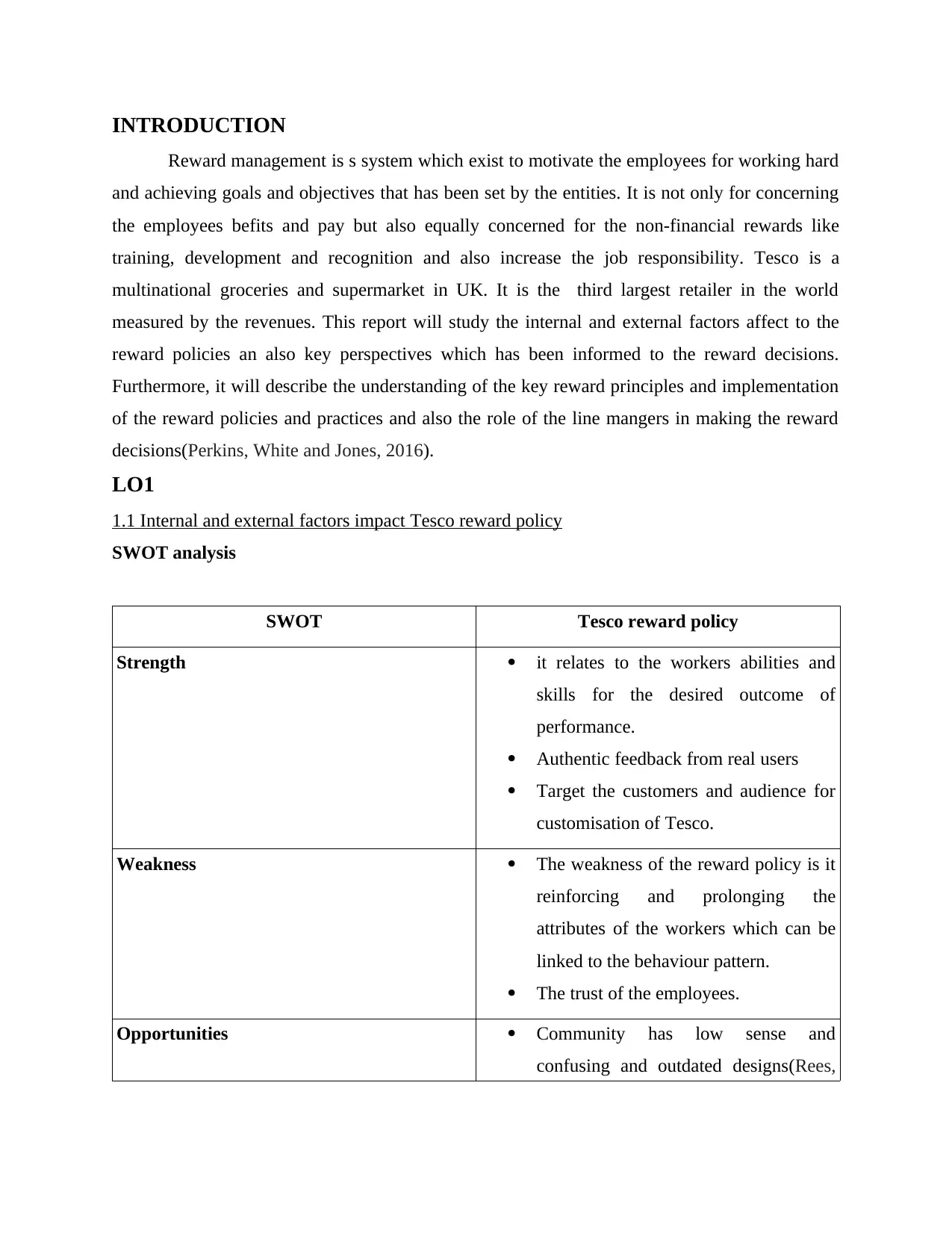
INTRODUCTION
Reward management is s system which exist to motivate the employees for working hard
and achieving goals and objectives that has been set by the entities. It is not only for concerning
the employees befits and pay but also equally concerned for the non-financial rewards like
training, development and recognition and also increase the job responsibility. Tesco is a
multinational groceries and supermarket in UK. It is the third largest retailer in the world
measured by the revenues. This report will study the internal and external factors affect to the
reward policies an also key perspectives which has been informed to the reward decisions.
Furthermore, it will describe the understanding of the key reward principles and implementation
of the reward policies and practices and also the role of the line mangers in making the reward
decisions(Perkins, White and Jones, 2016).
LO1
1.1 Internal and external factors impact Tesco reward policy
SWOT analysis
SWOT Tesco reward policy
Strength it relates to the workers abilities and
skills for the desired outcome of
performance.
Authentic feedback from real users
Target the customers and audience for
customisation of Tesco.
Weakness The weakness of the reward policy is it
reinforcing and prolonging the
attributes of the workers which can be
linked to the behaviour pattern.
The trust of the employees.
Opportunities Community has low sense and
confusing and outdated designs(Rees,
Reward management is s system which exist to motivate the employees for working hard
and achieving goals and objectives that has been set by the entities. It is not only for concerning
the employees befits and pay but also equally concerned for the non-financial rewards like
training, development and recognition and also increase the job responsibility. Tesco is a
multinational groceries and supermarket in UK. It is the third largest retailer in the world
measured by the revenues. This report will study the internal and external factors affect to the
reward policies an also key perspectives which has been informed to the reward decisions.
Furthermore, it will describe the understanding of the key reward principles and implementation
of the reward policies and practices and also the role of the line mangers in making the reward
decisions(Perkins, White and Jones, 2016).
LO1
1.1 Internal and external factors impact Tesco reward policy
SWOT analysis
SWOT Tesco reward policy
Strength it relates to the workers abilities and
skills for the desired outcome of
performance.
Authentic feedback from real users
Target the customers and audience for
customisation of Tesco.
Weakness The weakness of the reward policy is it
reinforcing and prolonging the
attributes of the workers which can be
linked to the behaviour pattern.
The trust of the employees.
Opportunities Community has low sense and
confusing and outdated designs(Rees,
⊘ This is a preview!⊘
Do you want full access?
Subscribe today to unlock all pages.

Trusted by 1+ million students worldwide
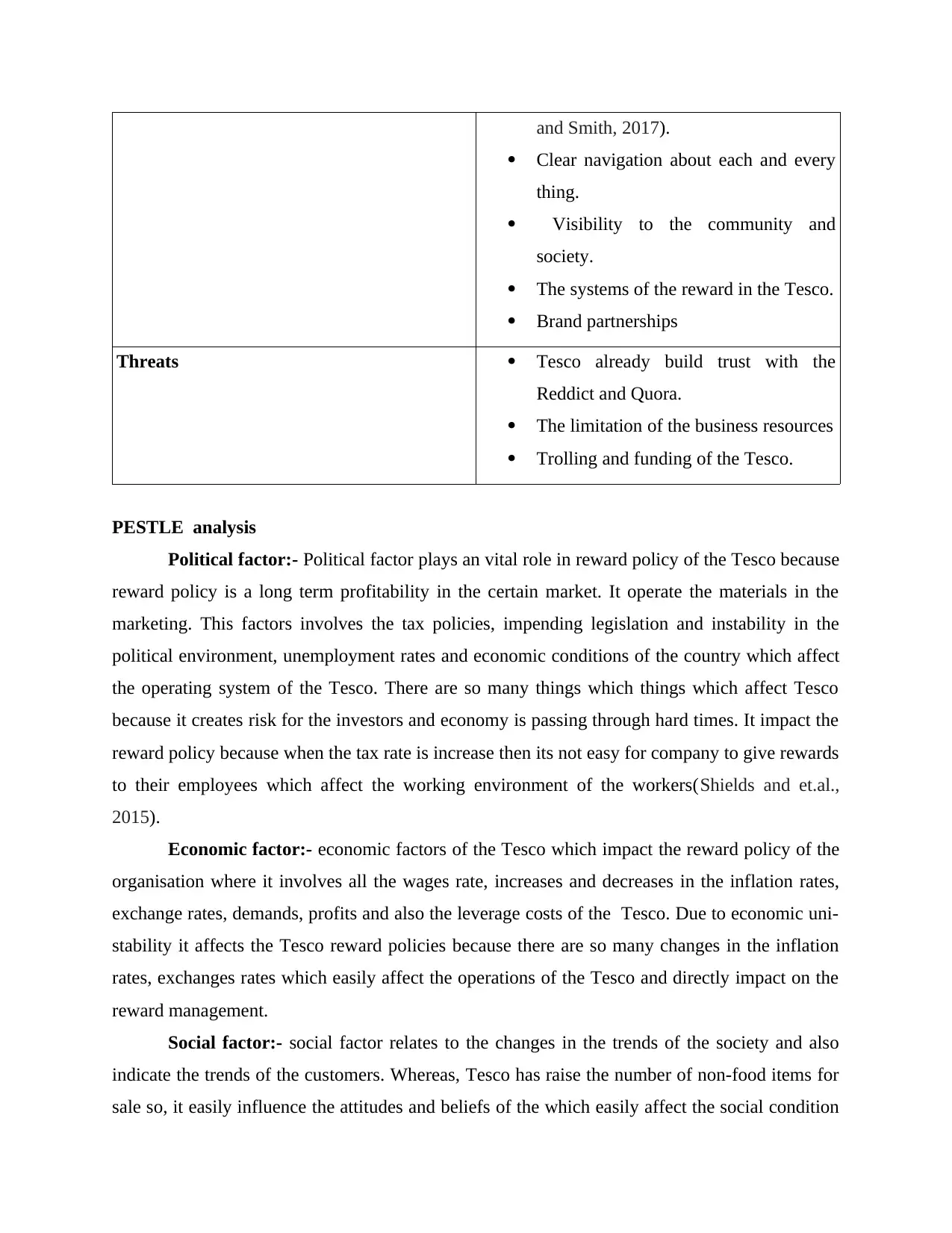
and Smith, 2017).
Clear navigation about each and every
thing.
Visibility to the community and
society.
The systems of the reward in the Tesco.
Brand partnerships
Threats Tesco already build trust with the
Reddict and Quora.
The limitation of the business resources
Trolling and funding of the Tesco.
PESTLE analysis
Political factor:- Political factor plays an vital role in reward policy of the Tesco because
reward policy is a long term profitability in the certain market. It operate the materials in the
marketing. This factors involves the tax policies, impending legislation and instability in the
political environment, unemployment rates and economic conditions of the country which affect
the operating system of the Tesco. There are so many things which things which affect Tesco
because it creates risk for the investors and economy is passing through hard times. It impact the
reward policy because when the tax rate is increase then its not easy for company to give rewards
to their employees which affect the working environment of the workers(Shields and et.al.,
2015).
Economic factor:- economic factors of the Tesco which impact the reward policy of the
organisation where it involves all the wages rate, increases and decreases in the inflation rates,
exchange rates, demands, profits and also the leverage costs of the Tesco. Due to economic uni-
stability it affects the Tesco reward policies because there are so many changes in the inflation
rates, exchanges rates which easily affect the operations of the Tesco and directly impact on the
reward management.
Social factor:- social factor relates to the changes in the trends of the society and also
indicate the trends of the customers. Whereas, Tesco has raise the number of non-food items for
sale so, it easily influence the attitudes and beliefs of the which easily affect the social condition
Clear navigation about each and every
thing.
Visibility to the community and
society.
The systems of the reward in the Tesco.
Brand partnerships
Threats Tesco already build trust with the
Reddict and Quora.
The limitation of the business resources
Trolling and funding of the Tesco.
PESTLE analysis
Political factor:- Political factor plays an vital role in reward policy of the Tesco because
reward policy is a long term profitability in the certain market. It operate the materials in the
marketing. This factors involves the tax policies, impending legislation and instability in the
political environment, unemployment rates and economic conditions of the country which affect
the operating system of the Tesco. There are so many things which things which affect Tesco
because it creates risk for the investors and economy is passing through hard times. It impact the
reward policy because when the tax rate is increase then its not easy for company to give rewards
to their employees which affect the working environment of the workers(Shields and et.al.,
2015).
Economic factor:- economic factors of the Tesco which impact the reward policy of the
organisation where it involves all the wages rate, increases and decreases in the inflation rates,
exchange rates, demands, profits and also the leverage costs of the Tesco. Due to economic uni-
stability it affects the Tesco reward policies because there are so many changes in the inflation
rates, exchanges rates which easily affect the operations of the Tesco and directly impact on the
reward management.
Social factor:- social factor relates to the changes in the trends of the society and also
indicate the trends of the customers. Whereas, Tesco has raise the number of non-food items for
sale so, it easily influence the attitudes and beliefs of the which easily affect the social condition
Paraphrase This Document
Need a fresh take? Get an instant paraphrase of this document with our AI Paraphraser
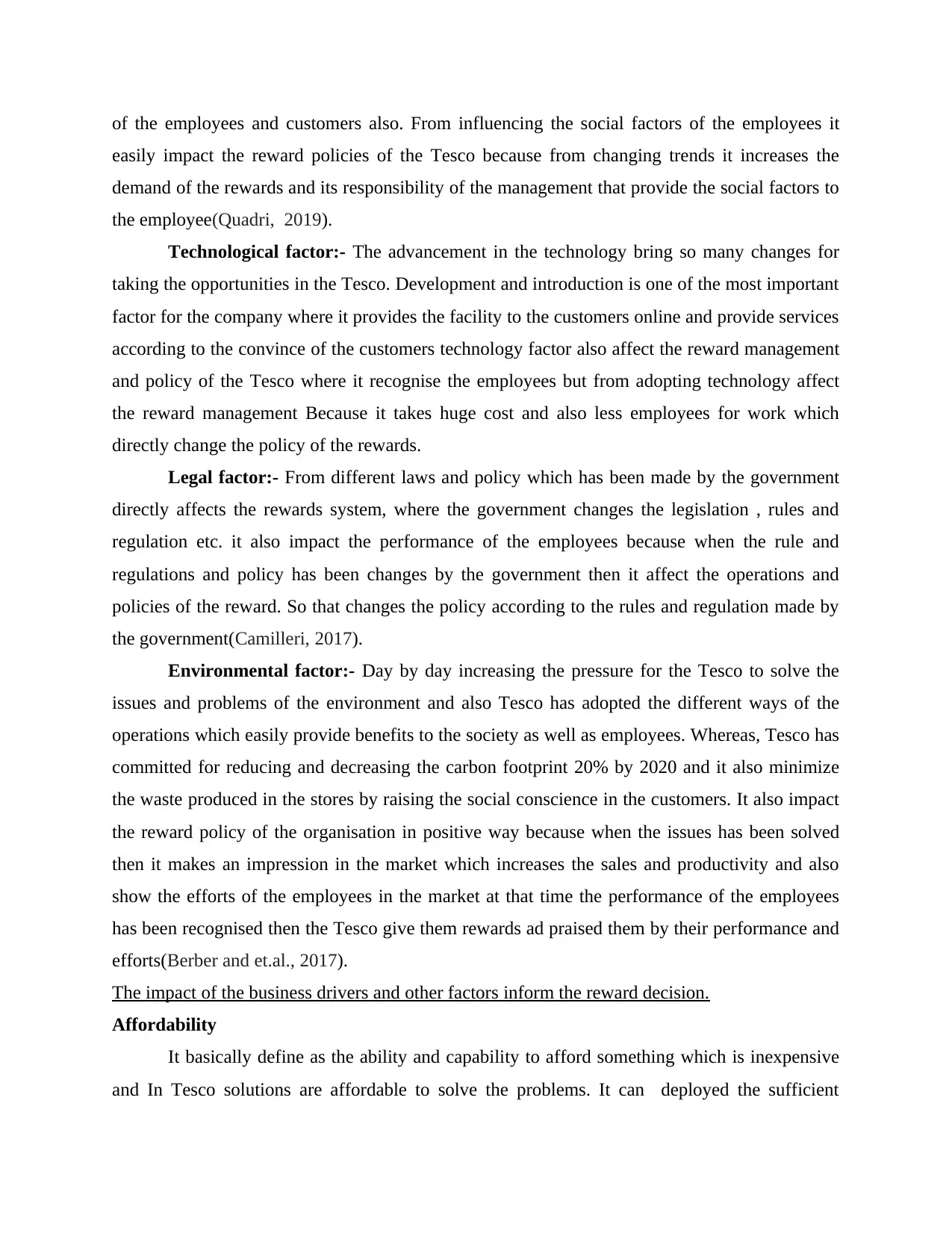
of the employees and customers also. From influencing the social factors of the employees it
easily impact the reward policies of the Tesco because from changing trends it increases the
demand of the rewards and its responsibility of the management that provide the social factors to
the employee(Quadri, 2019).
Technological factor:- The advancement in the technology bring so many changes for
taking the opportunities in the Tesco. Development and introduction is one of the most important
factor for the company where it provides the facility to the customers online and provide services
according to the convince of the customers technology factor also affect the reward management
and policy of the Tesco where it recognise the employees but from adopting technology affect
the reward management Because it takes huge cost and also less employees for work which
directly change the policy of the rewards.
Legal factor:- From different laws and policy which has been made by the government
directly affects the rewards system, where the government changes the legislation , rules and
regulation etc. it also impact the performance of the employees because when the rule and
regulations and policy has been changes by the government then it affect the operations and
policies of the reward. So that changes the policy according to the rules and regulation made by
the government(Camilleri, 2017).
Environmental factor:- Day by day increasing the pressure for the Tesco to solve the
issues and problems of the environment and also Tesco has adopted the different ways of the
operations which easily provide benefits to the society as well as employees. Whereas, Tesco has
committed for reducing and decreasing the carbon footprint 20% by 2020 and it also minimize
the waste produced in the stores by raising the social conscience in the customers. It also impact
the reward policy of the organisation in positive way because when the issues has been solved
then it makes an impression in the market which increases the sales and productivity and also
show the efforts of the employees in the market at that time the performance of the employees
has been recognised then the Tesco give them rewards ad praised them by their performance and
efforts(Berber and et.al., 2017).
The impact of the business drivers and other factors inform the reward decision.
Affordability
It basically define as the ability and capability to afford something which is inexpensive
and In Tesco solutions are affordable to solve the problems. It can deployed the sufficient
easily impact the reward policies of the Tesco because from changing trends it increases the
demand of the rewards and its responsibility of the management that provide the social factors to
the employee(Quadri, 2019).
Technological factor:- The advancement in the technology bring so many changes for
taking the opportunities in the Tesco. Development and introduction is one of the most important
factor for the company where it provides the facility to the customers online and provide services
according to the convince of the customers technology factor also affect the reward management
and policy of the Tesco where it recognise the employees but from adopting technology affect
the reward management Because it takes huge cost and also less employees for work which
directly change the policy of the rewards.
Legal factor:- From different laws and policy which has been made by the government
directly affects the rewards system, where the government changes the legislation , rules and
regulation etc. it also impact the performance of the employees because when the rule and
regulations and policy has been changes by the government then it affect the operations and
policies of the reward. So that changes the policy according to the rules and regulation made by
the government(Camilleri, 2017).
Environmental factor:- Day by day increasing the pressure for the Tesco to solve the
issues and problems of the environment and also Tesco has adopted the different ways of the
operations which easily provide benefits to the society as well as employees. Whereas, Tesco has
committed for reducing and decreasing the carbon footprint 20% by 2020 and it also minimize
the waste produced in the stores by raising the social conscience in the customers. It also impact
the reward policy of the organisation in positive way because when the issues has been solved
then it makes an impression in the market which increases the sales and productivity and also
show the efforts of the employees in the market at that time the performance of the employees
has been recognised then the Tesco give them rewards ad praised them by their performance and
efforts(Berber and et.al., 2017).
The impact of the business drivers and other factors inform the reward decision.
Affordability
It basically define as the ability and capability to afford something which is inexpensive
and In Tesco solutions are affordable to solve the problems. It can deployed the sufficient
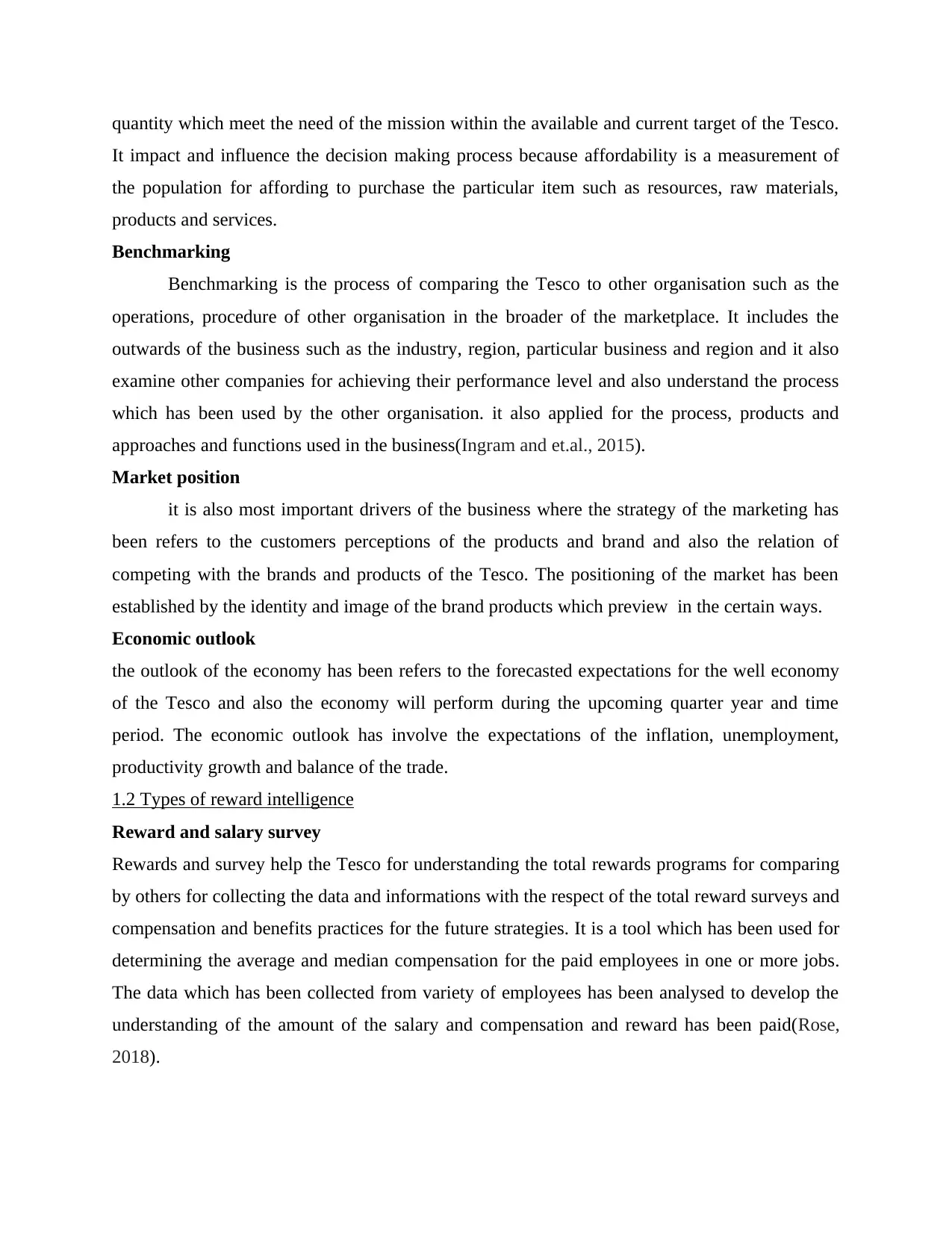
quantity which meet the need of the mission within the available and current target of the Tesco.
It impact and influence the decision making process because affordability is a measurement of
the population for affording to purchase the particular item such as resources, raw materials,
products and services.
Benchmarking
Benchmarking is the process of comparing the Tesco to other organisation such as the
operations, procedure of other organisation in the broader of the marketplace. It includes the
outwards of the business such as the industry, region, particular business and region and it also
examine other companies for achieving their performance level and also understand the process
which has been used by the other organisation. it also applied for the process, products and
approaches and functions used in the business(Ingram and et.al., 2015).
Market position
it is also most important drivers of the business where the strategy of the marketing has
been refers to the customers perceptions of the products and brand and also the relation of
competing with the brands and products of the Tesco. The positioning of the market has been
established by the identity and image of the brand products which preview in the certain ways.
Economic outlook
the outlook of the economy has been refers to the forecasted expectations for the well economy
of the Tesco and also the economy will perform during the upcoming quarter year and time
period. The economic outlook has involve the expectations of the inflation, unemployment,
productivity growth and balance of the trade.
1.2 Types of reward intelligence
Reward and salary survey
Rewards and survey help the Tesco for understanding the total rewards programs for comparing
by others for collecting the data and informations with the respect of the total reward surveys and
compensation and benefits practices for the future strategies. It is a tool which has been used for
determining the average and median compensation for the paid employees in one or more jobs.
The data which has been collected from variety of employees has been analysed to develop the
understanding of the amount of the salary and compensation and reward has been paid(Rose,
2018).
It impact and influence the decision making process because affordability is a measurement of
the population for affording to purchase the particular item such as resources, raw materials,
products and services.
Benchmarking
Benchmarking is the process of comparing the Tesco to other organisation such as the
operations, procedure of other organisation in the broader of the marketplace. It includes the
outwards of the business such as the industry, region, particular business and region and it also
examine other companies for achieving their performance level and also understand the process
which has been used by the other organisation. it also applied for the process, products and
approaches and functions used in the business(Ingram and et.al., 2015).
Market position
it is also most important drivers of the business where the strategy of the marketing has
been refers to the customers perceptions of the products and brand and also the relation of
competing with the brands and products of the Tesco. The positioning of the market has been
established by the identity and image of the brand products which preview in the certain ways.
Economic outlook
the outlook of the economy has been refers to the forecasted expectations for the well economy
of the Tesco and also the economy will perform during the upcoming quarter year and time
period. The economic outlook has involve the expectations of the inflation, unemployment,
productivity growth and balance of the trade.
1.2 Types of reward intelligence
Reward and salary survey
Rewards and survey help the Tesco for understanding the total rewards programs for comparing
by others for collecting the data and informations with the respect of the total reward surveys and
compensation and benefits practices for the future strategies. It is a tool which has been used for
determining the average and median compensation for the paid employees in one or more jobs.
The data which has been collected from variety of employees has been analysed to develop the
understanding of the amount of the salary and compensation and reward has been paid(Rose,
2018).
⊘ This is a preview!⊘
Do you want full access?
Subscribe today to unlock all pages.

Trusted by 1+ million students worldwide
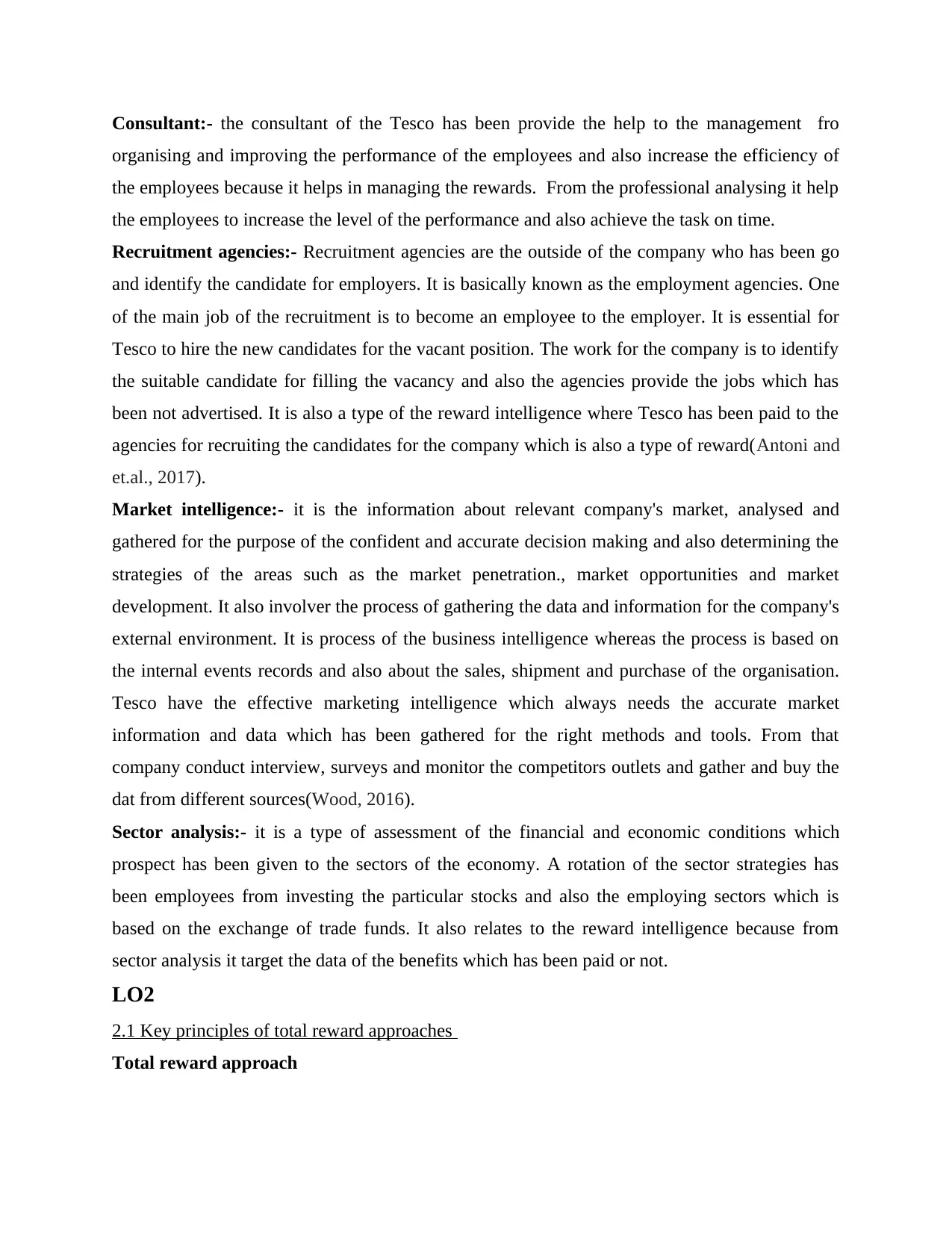
Consultant:- the consultant of the Tesco has been provide the help to the management fro
organising and improving the performance of the employees and also increase the efficiency of
the employees because it helps in managing the rewards. From the professional analysing it help
the employees to increase the level of the performance and also achieve the task on time.
Recruitment agencies:- Recruitment agencies are the outside of the company who has been go
and identify the candidate for employers. It is basically known as the employment agencies. One
of the main job of the recruitment is to become an employee to the employer. It is essential for
Tesco to hire the new candidates for the vacant position. The work for the company is to identify
the suitable candidate for filling the vacancy and also the agencies provide the jobs which has
been not advertised. It is also a type of the reward intelligence where Tesco has been paid to the
agencies for recruiting the candidates for the company which is also a type of reward(Antoni and
et.al., 2017).
Market intelligence:- it is the information about relevant company's market, analysed and
gathered for the purpose of the confident and accurate decision making and also determining the
strategies of the areas such as the market penetration., market opportunities and market
development. It also involver the process of gathering the data and information for the company's
external environment. It is process of the business intelligence whereas the process is based on
the internal events records and also about the sales, shipment and purchase of the organisation.
Tesco have the effective marketing intelligence which always needs the accurate market
information and data which has been gathered for the right methods and tools. From that
company conduct interview, surveys and monitor the competitors outlets and gather and buy the
dat from different sources(Wood, 2016).
Sector analysis:- it is a type of assessment of the financial and economic conditions which
prospect has been given to the sectors of the economy. A rotation of the sector strategies has
been employees from investing the particular stocks and also the employing sectors which is
based on the exchange of trade funds. It also relates to the reward intelligence because from
sector analysis it target the data of the benefits which has been paid or not.
LO2
2.1 Key principles of total reward approaches
Total reward approach
organising and improving the performance of the employees and also increase the efficiency of
the employees because it helps in managing the rewards. From the professional analysing it help
the employees to increase the level of the performance and also achieve the task on time.
Recruitment agencies:- Recruitment agencies are the outside of the company who has been go
and identify the candidate for employers. It is basically known as the employment agencies. One
of the main job of the recruitment is to become an employee to the employer. It is essential for
Tesco to hire the new candidates for the vacant position. The work for the company is to identify
the suitable candidate for filling the vacancy and also the agencies provide the jobs which has
been not advertised. It is also a type of the reward intelligence where Tesco has been paid to the
agencies for recruiting the candidates for the company which is also a type of reward(Antoni and
et.al., 2017).
Market intelligence:- it is the information about relevant company's market, analysed and
gathered for the purpose of the confident and accurate decision making and also determining the
strategies of the areas such as the market penetration., market opportunities and market
development. It also involver the process of gathering the data and information for the company's
external environment. It is process of the business intelligence whereas the process is based on
the internal events records and also about the sales, shipment and purchase of the organisation.
Tesco have the effective marketing intelligence which always needs the accurate market
information and data which has been gathered for the right methods and tools. From that
company conduct interview, surveys and monitor the competitors outlets and gather and buy the
dat from different sources(Wood, 2016).
Sector analysis:- it is a type of assessment of the financial and economic conditions which
prospect has been given to the sectors of the economy. A rotation of the sector strategies has
been employees from investing the particular stocks and also the employing sectors which is
based on the exchange of trade funds. It also relates to the reward intelligence because from
sector analysis it target the data of the benefits which has been paid or not.
LO2
2.1 Key principles of total reward approaches
Total reward approach
Paraphrase This Document
Need a fresh take? Get an instant paraphrase of this document with our AI Paraphraser
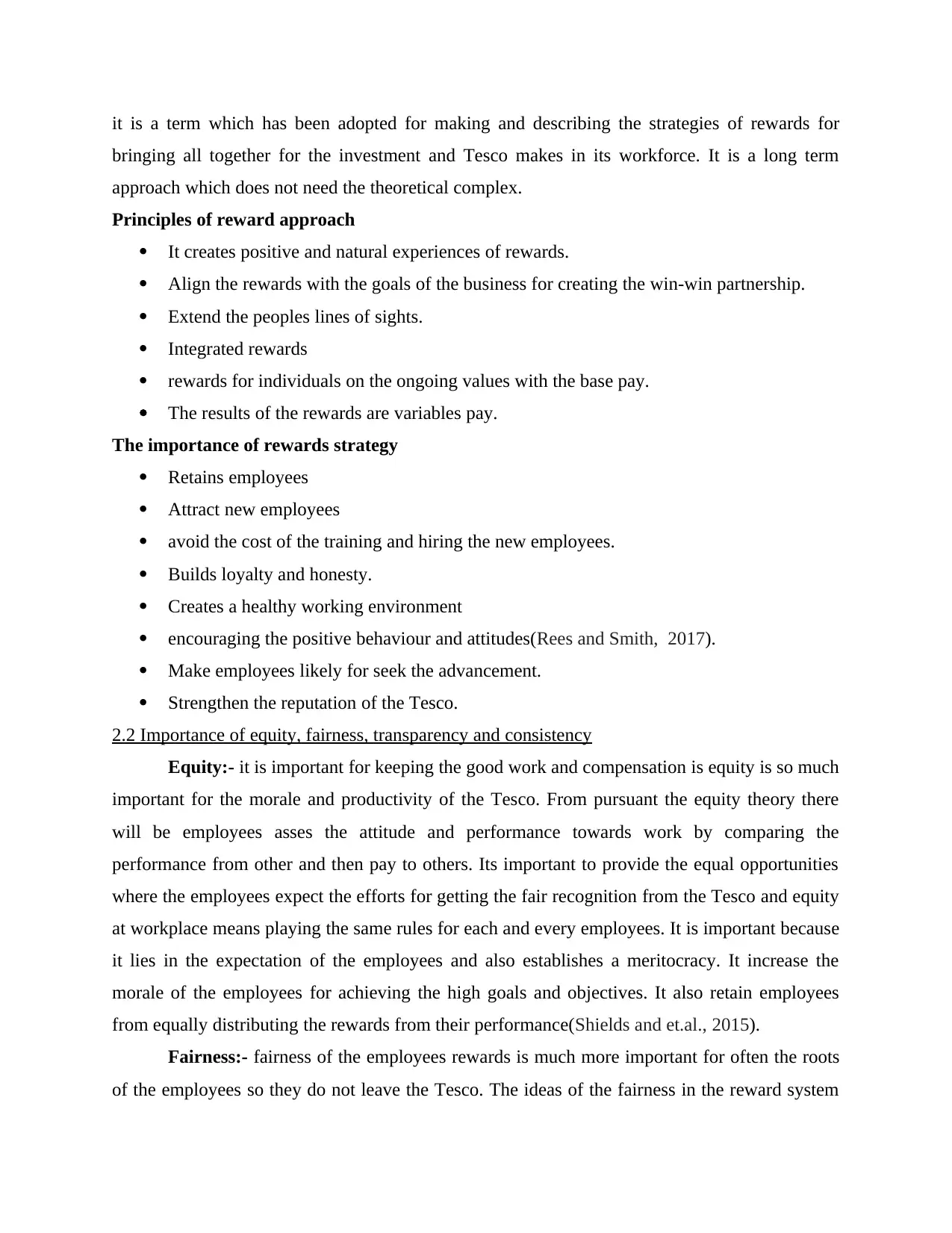
it is a term which has been adopted for making and describing the strategies of rewards for
bringing all together for the investment and Tesco makes in its workforce. It is a long term
approach which does not need the theoretical complex.
Principles of reward approach
It creates positive and natural experiences of rewards.
Align the rewards with the goals of the business for creating the win-win partnership.
Extend the peoples lines of sights.
Integrated rewards
rewards for individuals on the ongoing values with the base pay.
The results of the rewards are variables pay.
The importance of rewards strategy
Retains employees
Attract new employees
avoid the cost of the training and hiring the new employees.
Builds loyalty and honesty.
Creates a healthy working environment
encouraging the positive behaviour and attitudes(Rees and Smith, 2017).
Make employees likely for seek the advancement.
Strengthen the reputation of the Tesco.
2.2 Importance of equity, fairness, transparency and consistency
Equity:- it is important for keeping the good work and compensation is equity is so much
important for the morale and productivity of the Tesco. From pursuant the equity theory there
will be employees asses the attitude and performance towards work by comparing the
performance from other and then pay to others. Its important to provide the equal opportunities
where the employees expect the efforts for getting the fair recognition from the Tesco and equity
at workplace means playing the same rules for each and every employees. It is important because
it lies in the expectation of the employees and also establishes a meritocracy. It increase the
morale of the employees for achieving the high goals and objectives. It also retain employees
from equally distributing the rewards from their performance(Shields and et.al., 2015).
Fairness:- fairness of the employees rewards is much more important for often the roots
of the employees so they do not leave the Tesco. The ideas of the fairness in the reward system
bringing all together for the investment and Tesco makes in its workforce. It is a long term
approach which does not need the theoretical complex.
Principles of reward approach
It creates positive and natural experiences of rewards.
Align the rewards with the goals of the business for creating the win-win partnership.
Extend the peoples lines of sights.
Integrated rewards
rewards for individuals on the ongoing values with the base pay.
The results of the rewards are variables pay.
The importance of rewards strategy
Retains employees
Attract new employees
avoid the cost of the training and hiring the new employees.
Builds loyalty and honesty.
Creates a healthy working environment
encouraging the positive behaviour and attitudes(Rees and Smith, 2017).
Make employees likely for seek the advancement.
Strengthen the reputation of the Tesco.
2.2 Importance of equity, fairness, transparency and consistency
Equity:- it is important for keeping the good work and compensation is equity is so much
important for the morale and productivity of the Tesco. From pursuant the equity theory there
will be employees asses the attitude and performance towards work by comparing the
performance from other and then pay to others. Its important to provide the equal opportunities
where the employees expect the efforts for getting the fair recognition from the Tesco and equity
at workplace means playing the same rules for each and every employees. It is important because
it lies in the expectation of the employees and also establishes a meritocracy. It increase the
morale of the employees for achieving the high goals and objectives. It also retain employees
from equally distributing the rewards from their performance(Shields and et.al., 2015).
Fairness:- fairness of the employees rewards is much more important for often the roots
of the employees so they do not leave the Tesco. The ideas of the fairness in the reward system
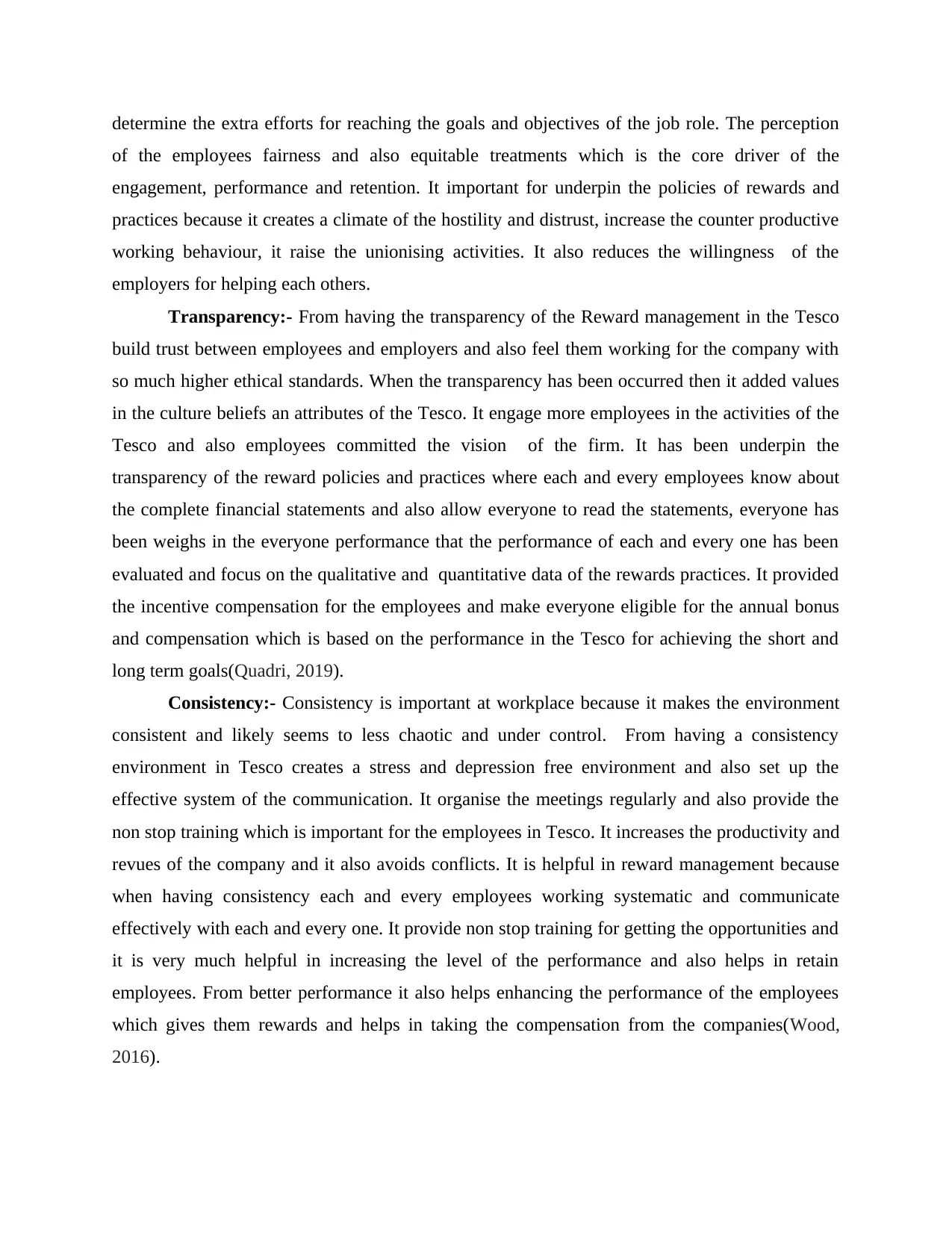
determine the extra efforts for reaching the goals and objectives of the job role. The perception
of the employees fairness and also equitable treatments which is the core driver of the
engagement, performance and retention. It important for underpin the policies of rewards and
practices because it creates a climate of the hostility and distrust, increase the counter productive
working behaviour, it raise the unionising activities. It also reduces the willingness of the
employers for helping each others.
Transparency:- From having the transparency of the Reward management in the Tesco
build trust between employees and employers and also feel them working for the company with
so much higher ethical standards. When the transparency has been occurred then it added values
in the culture beliefs an attributes of the Tesco. It engage more employees in the activities of the
Tesco and also employees committed the vision of the firm. It has been underpin the
transparency of the reward policies and practices where each and every employees know about
the complete financial statements and also allow everyone to read the statements, everyone has
been weighs in the everyone performance that the performance of each and every one has been
evaluated and focus on the qualitative and quantitative data of the rewards practices. It provided
the incentive compensation for the employees and make everyone eligible for the annual bonus
and compensation which is based on the performance in the Tesco for achieving the short and
long term goals(Quadri, 2019).
Consistency:- Consistency is important at workplace because it makes the environment
consistent and likely seems to less chaotic and under control. From having a consistency
environment in Tesco creates a stress and depression free environment and also set up the
effective system of the communication. It organise the meetings regularly and also provide the
non stop training which is important for the employees in Tesco. It increases the productivity and
revues of the company and it also avoids conflicts. It is helpful in reward management because
when having consistency each and every employees working systematic and communicate
effectively with each and every one. It provide non stop training for getting the opportunities and
it is very much helpful in increasing the level of the performance and also helps in retain
employees. From better performance it also helps enhancing the performance of the employees
which gives them rewards and helps in taking the compensation from the companies(Wood,
2016).
of the employees fairness and also equitable treatments which is the core driver of the
engagement, performance and retention. It important for underpin the policies of rewards and
practices because it creates a climate of the hostility and distrust, increase the counter productive
working behaviour, it raise the unionising activities. It also reduces the willingness of the
employers for helping each others.
Transparency:- From having the transparency of the Reward management in the Tesco
build trust between employees and employers and also feel them working for the company with
so much higher ethical standards. When the transparency has been occurred then it added values
in the culture beliefs an attributes of the Tesco. It engage more employees in the activities of the
Tesco and also employees committed the vision of the firm. It has been underpin the
transparency of the reward policies and practices where each and every employees know about
the complete financial statements and also allow everyone to read the statements, everyone has
been weighs in the everyone performance that the performance of each and every one has been
evaluated and focus on the qualitative and quantitative data of the rewards practices. It provided
the incentive compensation for the employees and make everyone eligible for the annual bonus
and compensation which is based on the performance in the Tesco for achieving the short and
long term goals(Quadri, 2019).
Consistency:- Consistency is important at workplace because it makes the environment
consistent and likely seems to less chaotic and under control. From having a consistency
environment in Tesco creates a stress and depression free environment and also set up the
effective system of the communication. It organise the meetings regularly and also provide the
non stop training which is important for the employees in Tesco. It increases the productivity and
revues of the company and it also avoids conflicts. It is helpful in reward management because
when having consistency each and every employees working systematic and communicate
effectively with each and every one. It provide non stop training for getting the opportunities and
it is very much helpful in increasing the level of the performance and also helps in retain
employees. From better performance it also helps enhancing the performance of the employees
which gives them rewards and helps in taking the compensation from the companies(Wood,
2016).
⊘ This is a preview!⊘
Do you want full access?
Subscribe today to unlock all pages.

Trusted by 1+ million students worldwide
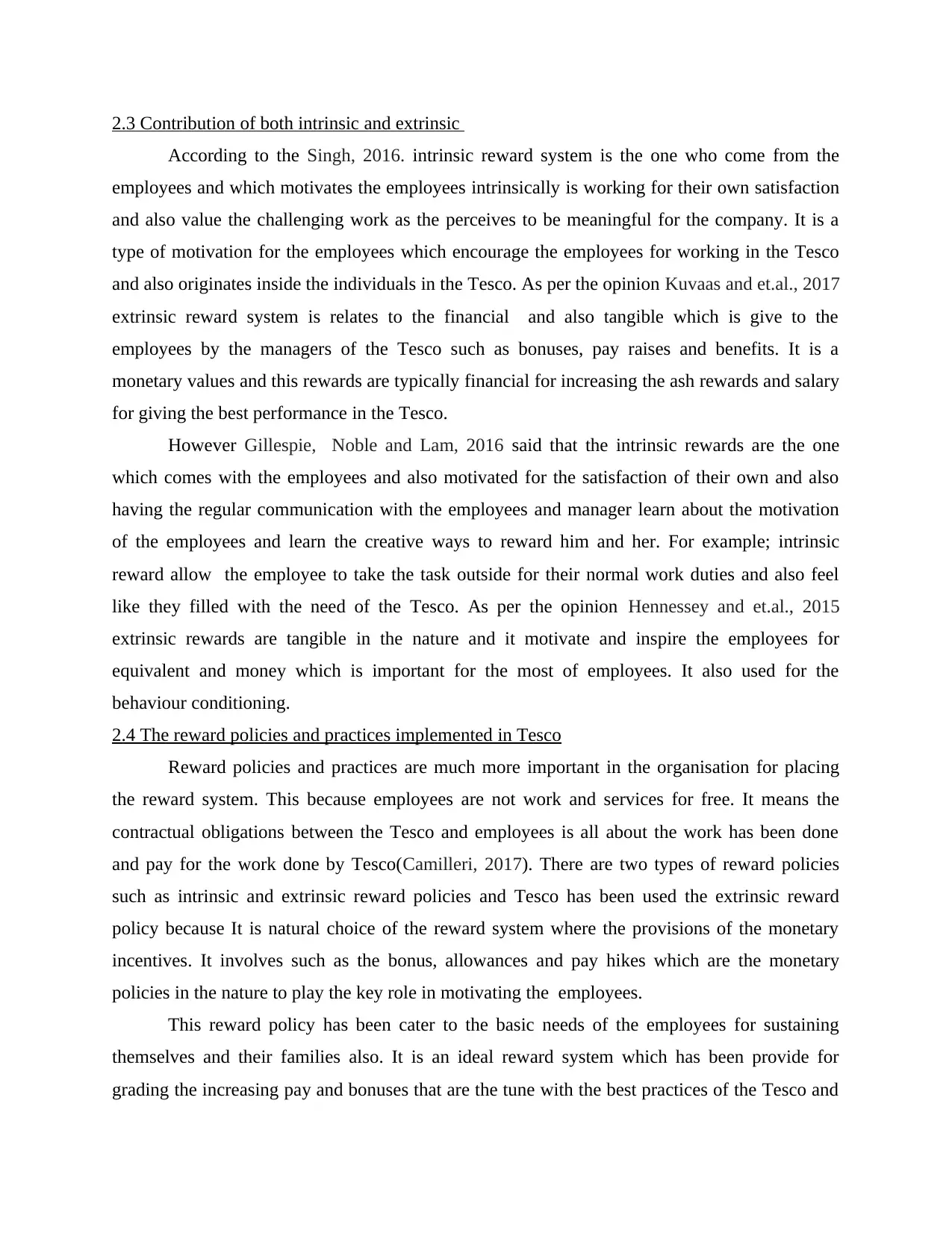
2.3 Contribution of both intrinsic and extrinsic
According to the Singh, 2016. intrinsic reward system is the one who come from the
employees and which motivates the employees intrinsically is working for their own satisfaction
and also value the challenging work as the perceives to be meaningful for the company. It is a
type of motivation for the employees which encourage the employees for working in the Tesco
and also originates inside the individuals in the Tesco. As per the opinion Kuvaas and et.al., 2017
extrinsic reward system is relates to the financial and also tangible which is give to the
employees by the managers of the Tesco such as bonuses, pay raises and benefits. It is a
monetary values and this rewards are typically financial for increasing the ash rewards and salary
for giving the best performance in the Tesco.
However Gillespie, Noble and Lam, 2016 said that the intrinsic rewards are the one
which comes with the employees and also motivated for the satisfaction of their own and also
having the regular communication with the employees and manager learn about the motivation
of the employees and learn the creative ways to reward him and her. For example; intrinsic
reward allow the employee to take the task outside for their normal work duties and also feel
like they filled with the need of the Tesco. As per the opinion Hennessey and et.al., 2015
extrinsic rewards are tangible in the nature and it motivate and inspire the employees for
equivalent and money which is important for the most of employees. It also used for the
behaviour conditioning.
2.4 The reward policies and practices implemented in Tesco
Reward policies and practices are much more important in the organisation for placing
the reward system. This because employees are not work and services for free. It means the
contractual obligations between the Tesco and employees is all about the work has been done
and pay for the work done by Tesco(Camilleri, 2017). There are two types of reward policies
such as intrinsic and extrinsic reward policies and Tesco has been used the extrinsic reward
policy because It is natural choice of the reward system where the provisions of the monetary
incentives. It involves such as the bonus, allowances and pay hikes which are the monetary
policies in the nature to play the key role in motivating the employees.
This reward policy has been cater to the basic needs of the employees for sustaining
themselves and their families also. It is an ideal reward system which has been provide for
grading the increasing pay and bonuses that are the tune with the best practices of the Tesco and
According to the Singh, 2016. intrinsic reward system is the one who come from the
employees and which motivates the employees intrinsically is working for their own satisfaction
and also value the challenging work as the perceives to be meaningful for the company. It is a
type of motivation for the employees which encourage the employees for working in the Tesco
and also originates inside the individuals in the Tesco. As per the opinion Kuvaas and et.al., 2017
extrinsic reward system is relates to the financial and also tangible which is give to the
employees by the managers of the Tesco such as bonuses, pay raises and benefits. It is a
monetary values and this rewards are typically financial for increasing the ash rewards and salary
for giving the best performance in the Tesco.
However Gillespie, Noble and Lam, 2016 said that the intrinsic rewards are the one
which comes with the employees and also motivated for the satisfaction of their own and also
having the regular communication with the employees and manager learn about the motivation
of the employees and learn the creative ways to reward him and her. For example; intrinsic
reward allow the employee to take the task outside for their normal work duties and also feel
like they filled with the need of the Tesco. As per the opinion Hennessey and et.al., 2015
extrinsic rewards are tangible in the nature and it motivate and inspire the employees for
equivalent and money which is important for the most of employees. It also used for the
behaviour conditioning.
2.4 The reward policies and practices implemented in Tesco
Reward policies and practices are much more important in the organisation for placing
the reward system. This because employees are not work and services for free. It means the
contractual obligations between the Tesco and employees is all about the work has been done
and pay for the work done by Tesco(Camilleri, 2017). There are two types of reward policies
such as intrinsic and extrinsic reward policies and Tesco has been used the extrinsic reward
policy because It is natural choice of the reward system where the provisions of the monetary
incentives. It involves such as the bonus, allowances and pay hikes which are the monetary
policies in the nature to play the key role in motivating the employees.
This reward policy has been cater to the basic needs of the employees for sustaining
themselves and their families also. It is an ideal reward system which has been provide for
grading the increasing pay and bonuses that are the tune with the best practices of the Tesco and
Paraphrase This Document
Need a fresh take? Get an instant paraphrase of this document with our AI Paraphraser
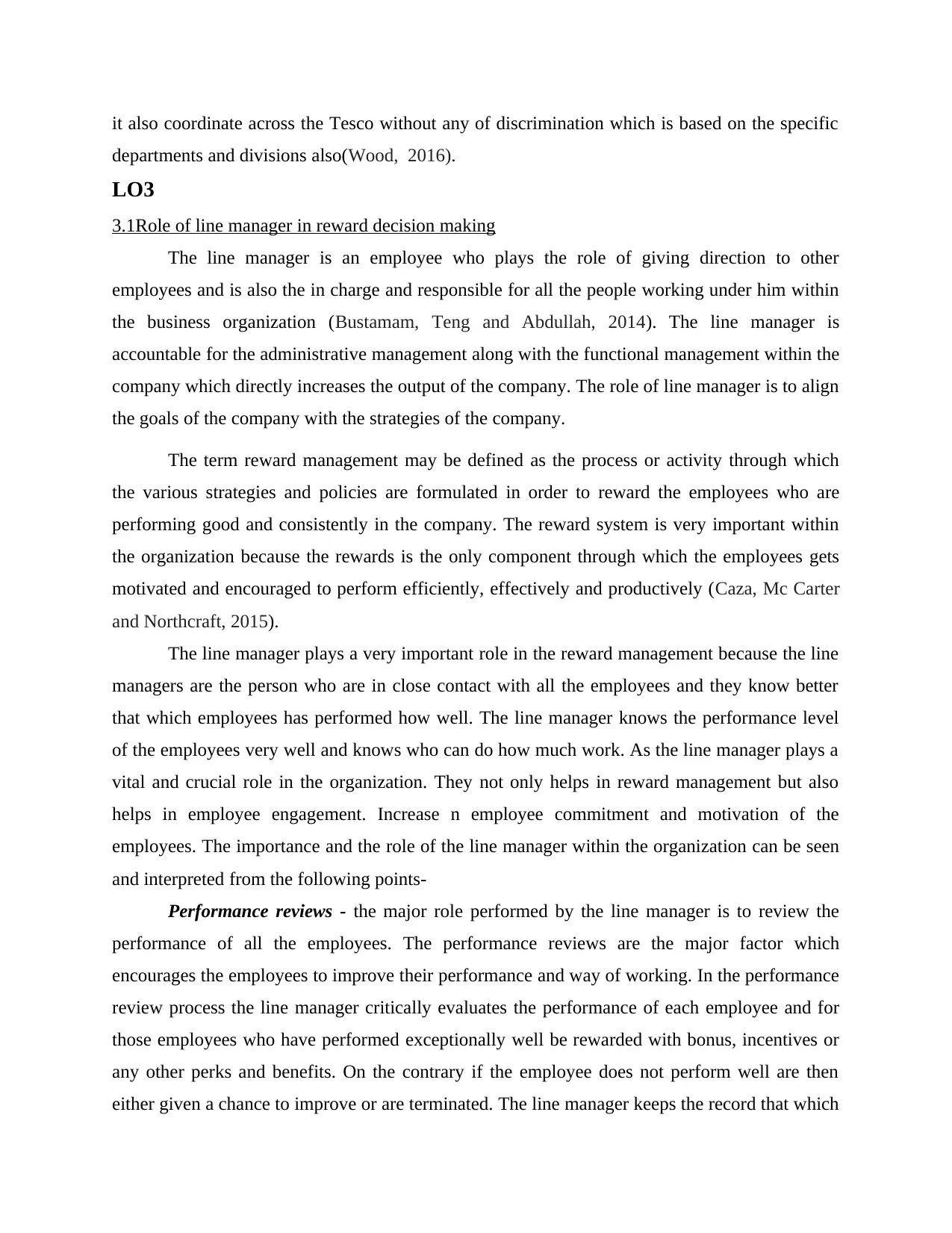
it also coordinate across the Tesco without any of discrimination which is based on the specific
departments and divisions also(Wood, 2016).
LO3
3.1Role of line manager in reward decision making
The line manager is an employee who plays the role of giving direction to other
employees and is also the in charge and responsible for all the people working under him within
the business organization (Bustamam, Teng and Abdullah, 2014). The line manager is
accountable for the administrative management along with the functional management within the
company which directly increases the output of the company. The role of line manager is to align
the goals of the company with the strategies of the company.
The term reward management may be defined as the process or activity through which
the various strategies and policies are formulated in order to reward the employees who are
performing good and consistently in the company. The reward system is very important within
the organization because the rewards is the only component through which the employees gets
motivated and encouraged to perform efficiently, effectively and productively (Caza, Mc Carter
and Northcraft, 2015).
The line manager plays a very important role in the reward management because the line
managers are the person who are in close contact with all the employees and they know better
that which employees has performed how well. The line manager knows the performance level
of the employees very well and knows who can do how much work. As the line manager plays a
vital and crucial role in the organization. They not only helps in reward management but also
helps in employee engagement. Increase n employee commitment and motivation of the
employees. The importance and the role of the line manager within the organization can be seen
and interpreted from the following points-
Performance reviews - the major role performed by the line manager is to review the
performance of all the employees. The performance reviews are the major factor which
encourages the employees to improve their performance and way of working. In the performance
review process the line manager critically evaluates the performance of each employee and for
those employees who have performed exceptionally well be rewarded with bonus, incentives or
any other perks and benefits. On the contrary if the employee does not perform well are then
either given a chance to improve or are terminated. The line manager keeps the record that which
departments and divisions also(Wood, 2016).
LO3
3.1Role of line manager in reward decision making
The line manager is an employee who plays the role of giving direction to other
employees and is also the in charge and responsible for all the people working under him within
the business organization (Bustamam, Teng and Abdullah, 2014). The line manager is
accountable for the administrative management along with the functional management within the
company which directly increases the output of the company. The role of line manager is to align
the goals of the company with the strategies of the company.
The term reward management may be defined as the process or activity through which
the various strategies and policies are formulated in order to reward the employees who are
performing good and consistently in the company. The reward system is very important within
the organization because the rewards is the only component through which the employees gets
motivated and encouraged to perform efficiently, effectively and productively (Caza, Mc Carter
and Northcraft, 2015).
The line manager plays a very important role in the reward management because the line
managers are the person who are in close contact with all the employees and they know better
that which employees has performed how well. The line manager knows the performance level
of the employees very well and knows who can do how much work. As the line manager plays a
vital and crucial role in the organization. They not only helps in reward management but also
helps in employee engagement. Increase n employee commitment and motivation of the
employees. The importance and the role of the line manager within the organization can be seen
and interpreted from the following points-
Performance reviews - the major role performed by the line manager is to review the
performance of all the employees. The performance reviews are the major factor which
encourages the employees to improve their performance and way of working. In the performance
review process the line manager critically evaluates the performance of each employee and for
those employees who have performed exceptionally well be rewarded with bonus, incentives or
any other perks and benefits. On the contrary if the employee does not perform well are then
either given a chance to improve or are terminated. The line manager keeps the record that which
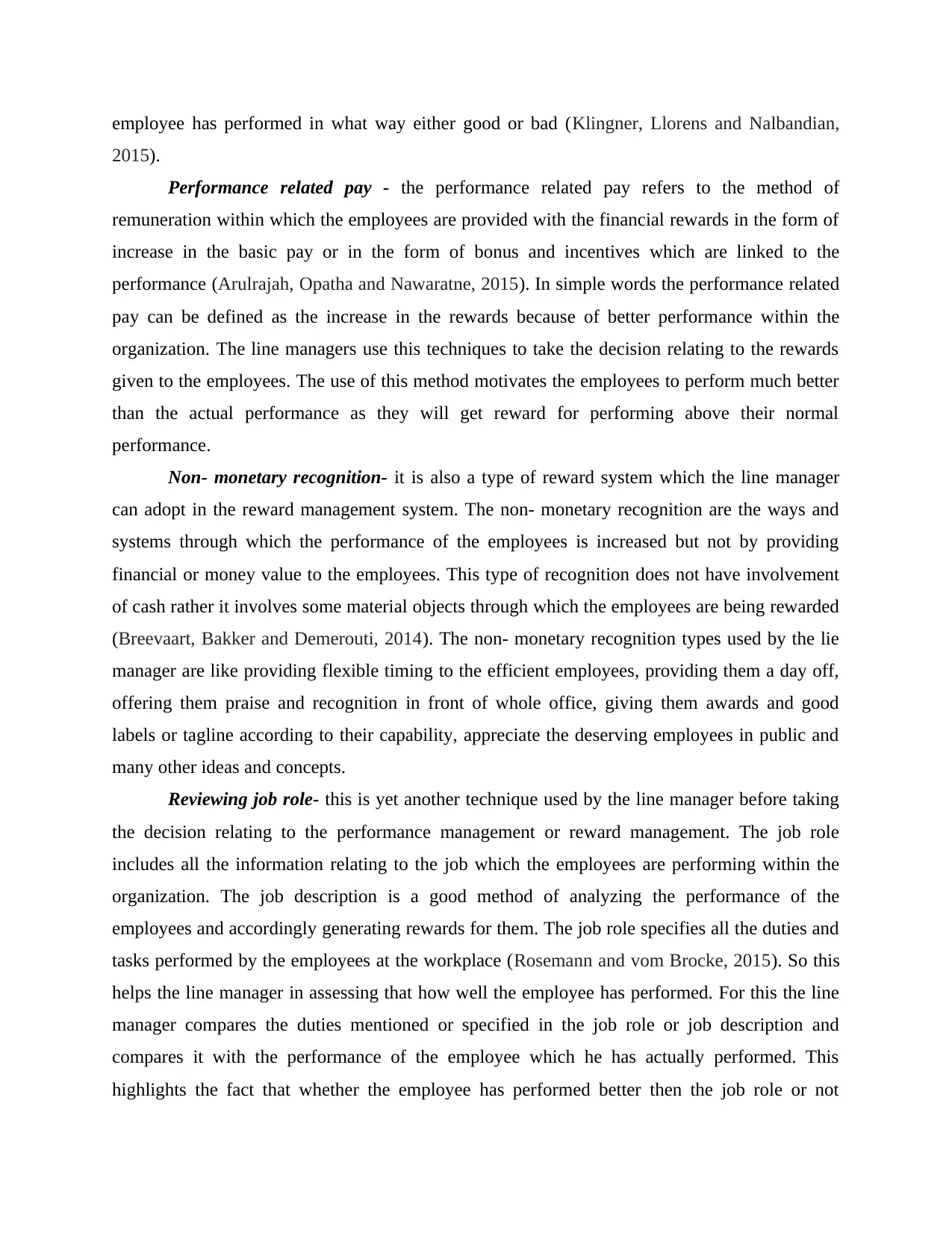
employee has performed in what way either good or bad (Klingner, Llorens and Nalbandian,
2015).
Performance related pay - the performance related pay refers to the method of
remuneration within which the employees are provided with the financial rewards in the form of
increase in the basic pay or in the form of bonus and incentives which are linked to the
performance (Arulrajah, Opatha and Nawaratne, 2015). In simple words the performance related
pay can be defined as the increase in the rewards because of better performance within the
organization. The line managers use this techniques to take the decision relating to the rewards
given to the employees. The use of this method motivates the employees to perform much better
than the actual performance as they will get reward for performing above their normal
performance.
Non- monetary recognition- it is also a type of reward system which the line manager
can adopt in the reward management system. The non- monetary recognition are the ways and
systems through which the performance of the employees is increased but not by providing
financial or money value to the employees. This type of recognition does not have involvement
of cash rather it involves some material objects through which the employees are being rewarded
(Breevaart, Bakker and Demerouti, 2014). The non- monetary recognition types used by the lie
manager are like providing flexible timing to the efficient employees, providing them a day off,
offering them praise and recognition in front of whole office, giving them awards and good
labels or tagline according to their capability, appreciate the deserving employees in public and
many other ideas and concepts.
Reviewing job role- this is yet another technique used by the line manager before taking
the decision relating to the performance management or reward management. The job role
includes all the information relating to the job which the employees are performing within the
organization. The job description is a good method of analyzing the performance of the
employees and accordingly generating rewards for them. The job role specifies all the duties and
tasks performed by the employees at the workplace (Rosemann and vom Brocke, 2015). So this
helps the line manager in assessing that how well the employee has performed. For this the line
manager compares the duties mentioned or specified in the job role or job description and
compares it with the performance of the employee which he has actually performed. This
highlights the fact that whether the employee has performed better then the job role or not
2015).
Performance related pay - the performance related pay refers to the method of
remuneration within which the employees are provided with the financial rewards in the form of
increase in the basic pay or in the form of bonus and incentives which are linked to the
performance (Arulrajah, Opatha and Nawaratne, 2015). In simple words the performance related
pay can be defined as the increase in the rewards because of better performance within the
organization. The line managers use this techniques to take the decision relating to the rewards
given to the employees. The use of this method motivates the employees to perform much better
than the actual performance as they will get reward for performing above their normal
performance.
Non- monetary recognition- it is also a type of reward system which the line manager
can adopt in the reward management system. The non- monetary recognition are the ways and
systems through which the performance of the employees is increased but not by providing
financial or money value to the employees. This type of recognition does not have involvement
of cash rather it involves some material objects through which the employees are being rewarded
(Breevaart, Bakker and Demerouti, 2014). The non- monetary recognition types used by the lie
manager are like providing flexible timing to the efficient employees, providing them a day off,
offering them praise and recognition in front of whole office, giving them awards and good
labels or tagline according to their capability, appreciate the deserving employees in public and
many other ideas and concepts.
Reviewing job role- this is yet another technique used by the line manager before taking
the decision relating to the performance management or reward management. The job role
includes all the information relating to the job which the employees are performing within the
organization. The job description is a good method of analyzing the performance of the
employees and accordingly generating rewards for them. The job role specifies all the duties and
tasks performed by the employees at the workplace (Rosemann and vom Brocke, 2015). So this
helps the line manager in assessing that how well the employee has performed. For this the line
manager compares the duties mentioned or specified in the job role or job description and
compares it with the performance of the employee which he has actually performed. This
highlights the fact that whether the employee has performed better then the job role or not
⊘ This is a preview!⊘
Do you want full access?
Subscribe today to unlock all pages.

Trusted by 1+ million students worldwide
1 out of 15
Related Documents
Your All-in-One AI-Powered Toolkit for Academic Success.
+13062052269
info@desklib.com
Available 24*7 on WhatsApp / Email
![[object Object]](/_next/static/media/star-bottom.7253800d.svg)
Unlock your academic potential
Copyright © 2020–2026 A2Z Services. All Rights Reserved. Developed and managed by ZUCOL.





